Department faculty honored at 2014 Celebration of Faculty Excellence
Several members of the University of Louisville Department of Medicine were recognized at the 2014 UofL Celebrations of Faculty Excellence.
The University of Louisville administration recently held the 2014 Celebration of Faculty Excellence. The awards were conferred by Provost Shirley Willihnganz and William Pierce, executive vice president for research and innovation.
"Great universities have great faculty," UofL President James Ramsey said. "We have a great faculty – a truly amazing faculty – at the University of Louisville. We have a faculty who excel in teaching, service, scholarship, research and creative activity. A faculty who care. A faculty who raise the bar for all of us as a university."
Several current and former members of the University of Louisville Department of Medicine were among those recognized.
President's Distinguished Faculty Awards
(Award winners receive a medallion and a check for $1,000. They will be featured on campus banners later this year.)
 Kelly McCants
Kelly McCants
Distinguished Faculty Awards in Teaching - Distinguished Teaching Professor Award for Full-time Teaching
McCants served as director of cardiac transplantation and was the primary transplant physician at Jewish Hospital.
He was actively involved in the mentorship and training of clinical fellows and started the very first Advanced Heart Failure Fellowship Program in Kentucky.
McCants is experienced in right heart catheterizations, myocardial biopsies, management of Left Ventricular Assist Devices, and other therapies for advanced heart failure.
Faculty members whose work has resulted in U.S. patents and licenses were also honored at the 2014 Celebration of Faculty Excellence.
"These faculty members have a passion for knowledge and discovery, and a commitment to the university to ensure that their work is transferred to the private sector for commercial development and to the public sector for the common good," UofL President James Ramsey said during the award ceremony. "They wish their inventions to be available to the world for the benefit of humankind."
Department of Medicine honorees include:
Paula J. Bates
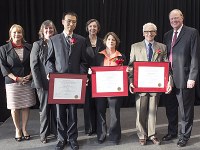 Bates is an associate professor of medicine, with joint appointments in the Departments of Biochemistry and Molecular Biology and as an associate scientist of the James Graham Brown Cancer Center.
Bates is an associate professor of medicine, with joint appointments in the Departments of Biochemistry and Molecular Biology and as an associate scientist of the James Graham Brown Cancer Center.
One of her major research interests is a class of anticancer agents known as "G-rich oligonucleotides" or "GROs," which she discovered in collaboration with Drs. John Trent and Donald Miller.
These inhibit the growth of many different types of cancer cells, but have no effect on normal cells, and are also being widely used throughout the world as tumor-targeting ligands.
Bates co-founded (with Drs. Trent and Miller) a Louisville-based biotechnology company named Aptamera to develop GROs, which culminated in one of the GROs (AGRO100, later renamed AS1411 and then ACT-GRO-777) becoming the first in its class to enter human clinical trials.
Bates' current research focuses on mechanistic aspects of GRO activities and — in collaboration with Drs. M. Tariq Malik and Martin O'Toole — she is developing GRO-linked nanoparticles for use in cancer therapy, imaging and drug delivery.
In collaboration with Dr. G. B. Hammond from the Department of Chemistry, Bates is also studying anticancer compounds derived from Amazonian plants and a novel synthetic agent that selectively kills cancer cells.
Jonathan "Brad" Chaires
Chaires is a professor in the Department of Medicine and the Department of Biochemistry and Molecular Biology. He holds the James Graham Brown Chair of Cancer Biophysics and is also a senior scientist in the James Graham Brown Cancer Center.
His current research interests are in the physical biochemistry of nucleic acids and their interactions, with particular emphasis on the integration of thermodynamics into the rational drug design process. In addition, he has pioneered the use of differential scanning calorimetry as a diagnostic tool.
Chaires is a founder of Louisville Biosciences Inc.
Jason Chesney

His laboratory recently discovered a drug that inhibits 6-phosphofructo-2-kinase and an optimized derivative of this drug entered phase I clinical trial testing in Spring 2014.
Chesney also has an active immunotherapeutics program that is focused on testing novel approaches to cause durable remissions through induction of tumor immunity in advanced solid malignancies.
His group was the first to demonstrate that Denileukin Diftitox can deplete the T regulatory cells that suppress immunity against cancers, causing objective tumor regressions in cancer patients.
Brian F. Clem
Clem works with a highly collaborative and synergistic group of investigators that include a computational biologist, biophysicist and cancer biologist in order to identify novel approaches to the treatment of cancer.
His lab studies the role of genetic alterations on metabolism during the transformation of normal, healthy cells to cancer cells and identifies novel molecular targets for chemotherapy development.
Previously, he was the lead investigator of the identification of the first small molecule inhibitor of 6-phosphofructo-2-kinase, 3PO, as well as a novel inhibitor of choline kinase, CK37. Both compounds have been commercially licensed and a more potent derivative of 3PO is currently undergoing phase I clinical trials in cancer patients.
Although his studies have implications for multiple tumor types, Dr. Clem seeks to identify novel agents with activity against breast and lung cancer, as well as leukemias.
Nichola C. Garbett
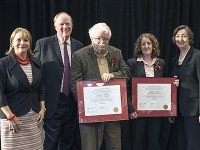 Garbett is an assistant professor of medicine and assistant director of the James Graham Brown Cancer Center Biophysical Core Facility.
Garbett is an assistant professor of medicine and assistant director of the James Graham Brown Cancer Center Biophysical Core Facility.
She was part of a Brown Cancer Center research team, with Drs. Jonathan B. Chaires and A. Bennett Jenson, which made a key discovery that the melting pattern of blood plasma, called a plasma thermogram, can be used as a diagnostic method for early detection, diagnosis and monitoring of disease.
She has continued to develop this technology as part of her independent research program centered on the development of biophysical approaches for medical diagnostics. Her recent PLOS ONE publication received international attention for the potential role of plasma thermograms in cervical cancer diagnosis.
Her current focus is on the development of plasma thermograms for monitoring of recurrence and therapeutic response in melanoma patients, in collaboration with Drs. Jason A. Chesney and Donald M. Miller.
She is a co-inventor on patent applications describing the plasma thermogram technology and a co-founder of a start-up company, Louisville Bioscience, Inc., formed to develop and commercialize plasma thermograms as a new diagnostic technology.
Jon Klein
Klein is the founder of the University of Louisville Core Proteomics Laboratory, one of the first university-based core proteomics laboratories in the United States. The Clinical Proteomics Program is focused solely on clinical biomarker discovery.
His own proteomics research has focused on biomarkers of kidney disease. Most recently the Core Proteomics Laboratory collaborated with investigators at Boston University Medical School to identify the target antigen responsible for idiopathic membranous nephropathy, work that was reported in the New England Journal of Medicine.
In collaboration with others, the Core Proteomics Laboratory has performed proteomics research in the fields of cancer biology, diabetes, Alzheimer’s disease, macular degeneration and sleep apnea.
Klein is a co-founder and president of Pharos Medicine, Inc., a UofL spin-off company, that develops clinical decision tools that incorporate proteomics-discovered biomarkers and computer methods to guide drug dosing.
Kenneth McLeish
McLeish is professor of medicine and director of the research laboratories for the Division of Nephrology and Hypertension at UofL. He also serves as chief of the renal section at the Robley Rex Veterans Affairs Medical Center.
McLeish's research focuses on the mechanisms of inflammation, most recently the control of granule release from neutrophils.
This research led to the development of peptides that inhibit granule release from human neutrophils and thereby diminish acute inflammation.
Michael Merchant
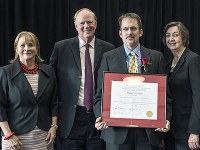 Merchant is an associate professor in the Departments of Medicine, and Pharmacology and Toxicology, as well as the co-director of the University of Louisville Core and Clinical Proteomics Laboratories.
Merchant is an associate professor in the Departments of Medicine, and Pharmacology and Toxicology, as well as the co-director of the University of Louisville Core and Clinical Proteomics Laboratories.
Merchant's research focuses on the application of mass spectrometry-based proteomic methods to study human health and disease.
His personal research focuses on the identification and confirmation of biomarkers associated with renal disease, or complications associated with renal disease such anemia or cardiovascular disease.
Merchant is a co-founder and chief technical officer for Biomarker Discovery of Pharos Medicine, Inc., a UofL spin-off company that develops clinical decision tools that incorporate proteomics-discovered biomarkers with computer methods to guide drug dosing.
Donald Miller
Miller is director of the James Graham Brown Cancer Center and associate vice president of health affairs.
Since his arrival in Louisville, the Brown Cancer Center has recruited more than 100 new cancer-related faculty and its research funding has grown by more than 200-fold. The Brown Cancer Center has developed a nationally recognized research program in cancer drug development with more than a dozen novel treatments being studied in their labs.
The unique strengths of BCC scientists have led to formation of the Advanced Cancer Therapeutics (ACT), a university/private investor partnership to develop novel therapeutics from the Brown Cancer Center labs.
Miller is a medical oncologist with a specific interest in the treatment of malignant melanoma.
In collaboration with Drs. Paula Bates and John Trent, also at the Brown Cancer Center, his laboratory discovered and developed AS1411, an oligonucleotide aptamer which binds to the protein, nucleolin, and inhibits the growth of a variety of tumor cell types.
Drs. Miller, Bates and Trent founded Aptamera, a successful biotech company to commercialize this discovery. His laboratory is currently studying short DNA sequences which cause cancer cells to "commit suicide."
Madhavi Rane
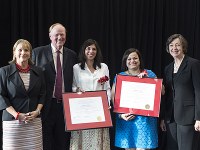 Rane is an associate professor in the Departments of Medicine, and Biochemistry and Molecular Biology.
Rane is an associate professor in the Departments of Medicine, and Biochemistry and Molecular Biology.
The focus of her research is the regulation of signal transduction pathways that control neutrophil activation and apoptosis in various models of inflammation.
As neutrophils are short lived cells that do not differentiate, her laboratory has developed antibody and protein transduction methodologies to over-express or sequester proteins of interest.
Her work identified a new role for heat shock protein 27 (Hsp27) as a scaffolding protein for Akt in the promotion of neutrophil survival.
Rane's current work has identified Nuclear Factor Erythroid-derived 2 (NF-E2), a novel Hsp27 binding protein that is also an Akt substrate, as a modulator of neutrophil apoptosis and inflammation.
Sucheta Telang
Telang practices neonatal medicine at Kosair Children's Hospital and conducts research in the Molecular Targets Program at the James Graham Brown Cancer Center.
Her research currently focuses on the examination of a regulatory enzyme, PFKFB4, in the glycolytic metabolism of cancer cells with the goal of validating this enzyme as a target for the development of small molecule inhibitors.
Telang also has developed multiple mouse models of cancer for the examination of PFKFB4 and other enzymes involved in tumor metabolism in vivo.
John Trent
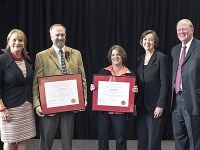 Trent is a professor of medicine, biochemistry and molecular biology and chemistry. He is leading the drug discovery efforts at the Brown Cancer Center with collaborators and three anticancer candidates have been licensed to Biotech for future development.
Trent is a professor of medicine, biochemistry and molecular biology and chemistry. He is leading the drug discovery efforts at the Brown Cancer Center with collaborators and three anticancer candidates have been licensed to Biotech for future development.
He has established a state of the art computational biology facility at the Brown Cancer Center. The Trent Laboratory, in partnership with the Kentucky Dataseam Initiative, is also using Kentucky School District computers in GRID computing for accelerating cancer drug discovery in over 50 K-12 school districts.
Trent is the director of the Brown Cancer Center Molecular Modeling Facility, and the director of the Brown Cancer Center Kosair Charities Pediatric Oncology Research Program.
He co-founded Aptamera along with Don Miller and Paula Bates in 2001 after they discovered AGRO100, the first anticancer DNA aptamer to enter clinical trials. A successful Phase I clinical trial of Aptamera's lead drug, AGRO100 (now designated AS1411) led to the acquisition by Antisoma, which AS1411 performed successfully in two Phase II cancer clinical trials.
Another first in class drug (PFK-158) based on a molecule he discovered, in collaboration with Jason Chesney, and developed by Advanced Cancer Therapeutics, started human cancer Phase I clinical trials in 2014.
Silvia M. Uriarte
Uriarte is an assistant professor of medicine, with an associate appointment in the Department of Microbiology and Immunology.
In 2005, she joined Dr. Kenneth R. McLeish group as a senior post-doctoral fellow and starting working in the role of neutrophil degranulation in the inflammatory response.
In collaboration with Drs. Kenneth R. McLeish and Madhavi Rane, the design of novel TAT-SNARE proteins that can selectively block neutrophil degranulation without compromising the antibacterial properties of the innate immune cells were developed and recently approved by the United States Patent Trademark Office.

